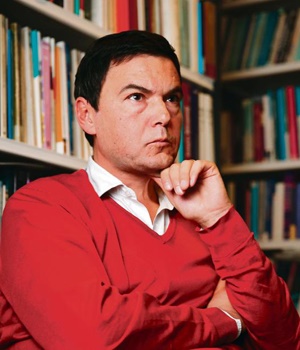
The 2015 Nelson Mandela Lecture gives us an opportunity to reaffirm our commitment to becoming a more equal, prosperous society. Thomas Piketty’s work on the need to tackle the growing levels of inequality in our times resonates strongly with Mandela’s ideals – that political freedom without socioeconomic justice is incomplete.
This lecture offers an opportunity to re-engage in the difficult conversations about how we are to “heal the divisions of the past and build a society based on democratic values, social justice and fundamental human rights”. Mandela’s ideals and inspirational leadership grew out of his personal journey as a poor, rural, black man who was given wings through education to fly out of apartheid-engineered poverty. Black people across generations remain committed to investments in education as a sure and tested way out of poverty.
Piketty’s analysis of patterns of accumulation of wealth provides the intellectual rationale for the ideals of social justice that traditional economists had ignored. Traditional economists, who promoted the trickle-down development model, justified inequality as an inevitable outcome in the promotion of economic growth and capital accumulation.
There is now consensus that inequality is bad for both rich and poor. Too great a degree of inequality makes building one nation with a shared vision impossible. Inequality, especially ours – which is coded by race, gender and geographic location – undermines social cohesion and shared citizenship. Inequality is also bad for sustainable economic growth because it excludes many talented people from contributing to the common good.
Contrary to the common view that new black entrants to the economy are driven by consumerism, they are in fact battling to provide for basic necessities.
Structural inequalities – such as basic asset scarcity (housing and household goods and services), long distances from work places because of apartheid’s spatial planning, and the costs of education and health – constrain opportunities for capital accumulation for many. Most black South African entrepreneurs are hampered by lack of access to capital and the cost of capital.
In our country, income inequality, rather than wealth concentration, is the biggest driver of inequality. But one cannot discount the effect of two of the richest people in South Africa, Johann Rupert and Nicky Oppenheimer, whose combined wealth equals the total wealth of 50% of our population.
Nor should we ignore the opportunity costs of illicit financial outflows amounting to $122 billion (R1.66 trillion) in the 2003-2012 period. In 2012 alone, $29 billion, or 7.6% of the size of our economy, was taken out through manipulations of transfer payments by companies and abuse of offshore trusts.
Piketty’s work challenges us to ask whether we have gone far enough in using tax as an effective tool for creating a more equal and just society. Germany and South Africa’s transformation to democracy provides key lessons about how to tackle structural inequalities.
Helmut Kohl, a conservative chancellor, led Germany to invest in equalisation between East and West through deliberate distributive fiscal and other socioeconomic programmes. At the heart of the interventions is the acceptance that unity and nation-building cannot be possible without corrective solidarity measures.
The implementation over 30 years of the solidarity tax on rich regions and individual citizens in favour of those who were poor has paid dividends. The strong inclusive growth has made Germany the anchor of the EU, now led by the first female chancellor and one who is originally from East Germany.
Our attempts to heal the divisions of the past partially succeeded under Mandela’s inspirational leadership. We faltered because of our hesitation to institute a solidarity tax after the 1996 Truth and Reconciliation Report, to provide the equalisation funds for investments in education, health and social infrastructure, including housing and public transport.
An additional 1% income tax for those earning more than R500 000 for 30 years would have provided the funds to eliminate shanty towns, mud schools and inadequate infrastructure where poor people live.
It is not too late to redesign a programme that is better geared to turn every development challenge into an opportunity for equalisation. An inclusive growth approach, accompanied by active citizenship in both the public and private sectors, is essential to healing the divisions of the past, and building a more equal and just society.
Ramphele is an active citizen.
The 13th annual Nelson Mandela Lecture at the University of Johannesburg will be held on October 3




 Publications
Publications
 Partners
Partners








